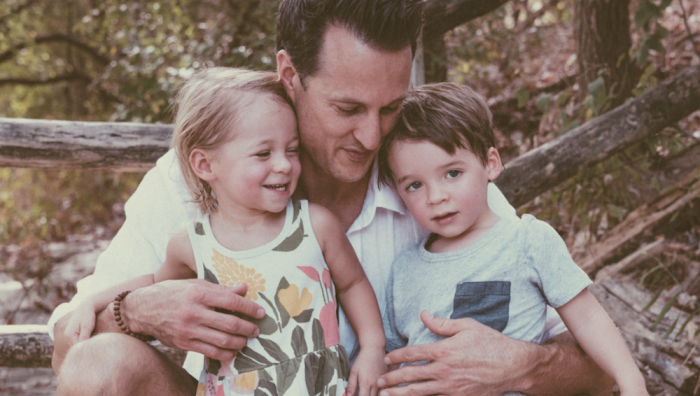Yes, I said it.
Not civil, not acceptable—joyful.
One point of qualification: not all adults have the maturity level or have committed sufficiently to their healing and emotional wellness to be of the mind to create such a situation. I know some mature adults who have tried diligently and are dealing with an ex-partner who is unwilling to meet them in a loving place, which is a source of incredible frustration. I believe it is possible for the willing co-parent to live in relative peace with such a partner, but that is a subject for another blog.
This article is for those who are deeply committed to their personal development and are willing to take the risk to forgive themselves and their partner, commit to and honor a ceaseless trek of compassion, even—if not especially—in the face of some rejection and undesirable responses, and, eventually, create a loving and peaceful relationship for your children and family.
I give credit to two of my dear friends, Jared and Denver, for sharing how they created a healthy, loving relationship with their ex-partners. I have expounded on that wisdom to create a method that has served my own family. I will forever be grateful to both of these powerful men for their support during the challenging transition into what is now a wonderful, nurturing partnership with Elisabeth, the mother of my sweet twins. I also owe a debt of gratitude to Elisabeth’s new life partner for his support in cocreating our loving family dynamic.
Step 1: Understand your part in the relationship and healing yourself.
>> How did you create hurt in the partnership?
>> What fears or past patterns from your childhood and prior relationships did you project?
>> Did you arouse jealousy, bitterness, or suspicion?
>> How did your ego show up in the relationship?
>> What are you not considering or willing to admit about your part in the relationship? Where are you at fault?
If you are struggling to sort out and understand the answers to these questions, I suggest seeking out a counselor. If you think you had no fault or are still in the state of blame, consider that you might be the adult who is unwilling to see their part. Blaming/shaming others and negative gossiping are the most clear signals of an unhealthy or unhealed relationship (often with the self).
There is no blame from me. If you can spot it, you got it. I have done it all with past partners and have learned everything I have through experience, followed by honest, inward reflection (with support from brutally honest friends and teachers). I have shut down emotionally with past partners and the twins’ mom, stonewalled, criticized, showed up with mommy issues, been ambivalent, and projected various forms of past fear and stories. The good news is these actions are all forgivable, the moment we become serious about changing our behavior.
Step 2: Forgive yourself and your partner.
We are all human. Get over it. If we want peace, we must first become peaceful in our own hearts. I used to hold onto resentment for long periods, weeks, years. Over time, I have closed that gap, as I have consistently experienced a deep sense of relief, gratitude, and joy when I let someone off the hook for being human. It is much easier once I have identified with my part in a relationship or any situation. Empathy flows when we get to the truth.
Step 3: Repair trust.
When you end a sexual relationship, trust is broken. With kids, you are forever “married” to your partner; rebuilding trust is the hardest thing to do.
I chose to write a letter to my ex that articulated my commitment to the co-parenting relationship and included a list of duties I was creating for myself to ensure the health of my children and our family. By stating these to my ex, I created the possibility of having a loving, compassionate, and supportive family dynamic, regardless of our living situation.
My words and behavior were initially received with reservation, but after some time honoring these commitments, the trust began to rebuild, and our relationship slowly started to flourish.
Some things I committed to the twins’ mother in that letter:
I will do everything I can to support the physical, emotional, and spiritual well-being of our children.
I will be loving and compassionate in my communication with you.
I will support the health and happiness of you and the twins.
I will uphold a lifestyle to maintain my own personal, emotional, physical, and spiritual needs.
I will only say loving things about you and your family in the presence of the kids and my own family.
I will never seek more than 50 percent custody, unless I sincerely fear the safety of the children.
I will help with finances related to the children in any way to assure security and education.
I am excited about and fully committed to be the best father and co-parent.
I will quickly take responsibility when I am at fault, and immediately make amends.
Step 4: Make a phone call or set up a meeting.
This is a sensitive and critical turning point in any relationship. I do not have a playbook, but humility, sensitivity, empathetic listening, and restraint are critical. Be mindful that both parties will feel vulnerable; therefore, it is essential not to be defensive, hurtful, or rejecting. Bring the change you want to create into this conversation.
Here are some guidelines:
>> Humbly admit your fault.
>> Do not blame and focus on what the other person did. You can say, “when this happened, it hurt me,” but avoid, “you did this…” at all costs.
>> Forgive your ex-partner in the most sincere way possible.
>> Ask for forgiveness for your part and do not depend on acceptance of your proposal (this may hurt, but it might take some time for your co-parent to arrive at a place of forgiveness).
>> Listen empathetically and acknowledge any concerns and feelings expressed by your partner.
Step 5: Only sweat the big stuff.
This does not require much explanation. I do not care for the cliché “pick your battles,” because battles are the farthest thing from creating a nurturing relationship. I once heard a gentleman referring to the mother of his child as “the enemy.” What possibilities does that create? What does that instill in the child?
Step 6: Do whatever it takes.
This is where the rubber meets the road. There is no separation between momma bear and the cubs. If you say ugly, derogatory things about your ex in general, and especially in front of your kids, you are hurting and arguably abusing your children. If you have truly forgiven your ex, outside of situations of abuse, you should be able to accept mistakes and character flaws of your partner as part of being human.
With that in mind, make these practices into habits:
>> If your ex-partner asks if you can change the schedule and it is possible, do it.
>> If there is an emotional need expressed and you can offer support, make time for it.
>> If you see something positive happening in their life, compliment them for it. Celebrate them.
>> Say loving things about your partner, especially in front of your children.
>> Create regular, set times to discuss finances and schedules three to four months out. This allows the focus of your conversations to be about the fun, joyful experiences you are sharing with your kids, not the stress of logistics and planning.
>> Be gentle and respectful, and listen when you bring up a concern or frustration. This is bound to happen; handling these sensitive conversations with kid gloves and restraint is critical to building a relationship with a healthy culture.
Healthy, loving co-parenting relationships are no different from a marriage. We must take care of our own physical, emotional, and spiritual needs to ensure we are healthy. After that, our primary focus should be to ensure that our co-parent is appreciated, emotionally supported, and loved.
Of course, you are not responsible for someone else’s emotions, but, at times, your support will define the success of the relationship when your partner needs a boost or is not receiving it fully from other relationships. You get out what you put in, and your service to your co-parent will radiate to your children.
I am so grateful that the twins’ mom has been willing to meet me in this space and co-create a beautiful relationship. I am told this is rare; I will tell you, it is not by accident. It is by design. I set an intention, enrolled my partner, and we both diligently invest in the success of our family.
This is a touchy subject, and every relationship is different. I welcome your feedback and would be honored to support you if you are serious about creating this in your life.












Read 0 comments and reply